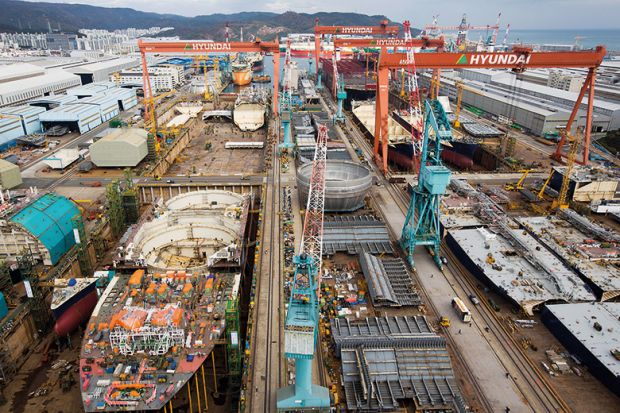Asian universities have been urged to see Donald Trump’s election as US president as an opportunity for recruiting the world’s best researchers and to shun “xenophobia” themselves.
Youngsuk Chi, chairman of Elsevier, made the comments on the first day of the Times Higher Education Asia Universities Summit, hosted by South Korea’s University of Ulsan and Ulsan Metropolitan City.
Joon-Sik Lee, South Korea’s deputy prime minister and education minister, was also among the speakers at the summit, on the theme of “building stronger alliances between universities and industry”.
Ulsan is a key South Korean industrial hub, home to Hyundai Heavy Industries’ shipyard (the world’s largest) and a Hyundai Motor Company car assembly plant (also the world’s largest). The University of Ulsan opened in 1970 after being established by the Hyundai Group’s founder, Ju-Yung Chung.
During his keynote speech on university-industry collaboration, Mr Chi presented figures showing “significant positive correlation between collaboration and patent citation. This suggests that research from academia-industry collaboration tends to be more directly connected to practical innovations that affect daily life.”
But he said that figures also show that academia-industry collaboration is on the decline. The key challenge is “finding each other, finding the right partner”, and data held by publishers could help here, he argued.
During a Q&A session, Mr Chi said: “The idea that President Trump could possibly cut funding for research in America should not just scare the American researchers – it should scare all of you in this room. Because we use that research to apply in our countries.”
But he added that the current situation in the US was also “an opportunity” for the Asia-Pacific region.
Mr Chi argued that the reasons why Asian universities have traditionally been ranked below US and European counterparts were their lower levels of funding and use of English.
The English language issue is now “levelling more”, he added. “With that out of the way and with the economic power to fund research in universities that we see in this region…hey, it’s time for you [Asian universities] to start attracting the best researchers. And you, too, should not be xenophobic.
“I’m a Korean by origin and I know this country can be very xenophobic too. We cannot be. Neither can Japan, or Thailand, or Singapore. We need to embrace people of different backgrounds so long as they can contribute to the thoughtful exchange of scholarship.
“The lesson is not only for the US; the lesson is for all of us.”
Mr Chi also said that he is often asked when South Korea will produce a Nobel prizewinner. His answer is “when we start to invest in basic science more”, rather than just in applied research.
Education minister Dr Lee said that the fourth industrial revolution – usually seen as encompassing developments in artificial intelligence, robotics, autonomous vehicles and the internet of things – would bring “transformative changes that we have never seen before”, which would lead to the “overhauling of industrial and labour market structure” as well as of the “very concept of individuals’ competency and qualifications”.
“In order to respond to the fourth industrial revolution, we need our universities to take a much bigger role,” said Dr Lee, a former Seoul National University professor. He called universities “the source of national competitiveness, which create new technologies, knowledge and talent”.
Register to continue
Why register?
- Registration is free and only takes a moment
- Once registered, you can read 3 articles a month
- Sign up for our newsletter
Subscribe
Or subscribe for unlimited access to:
- Unlimited access to news, views, insights & reviews
- Digital editions
- Digital access to THE’s university and college rankings analysis
Already registered or a current subscriber? Login








